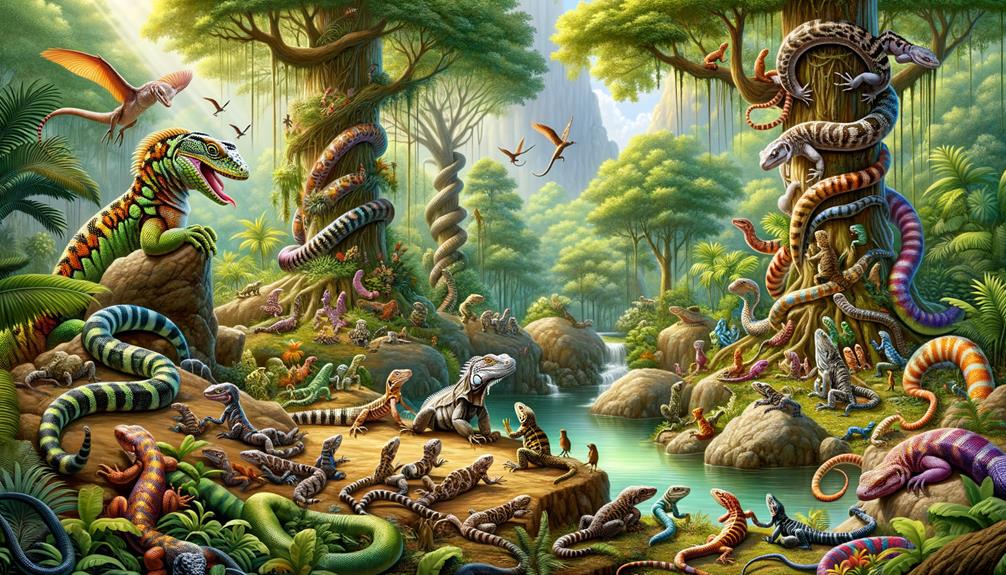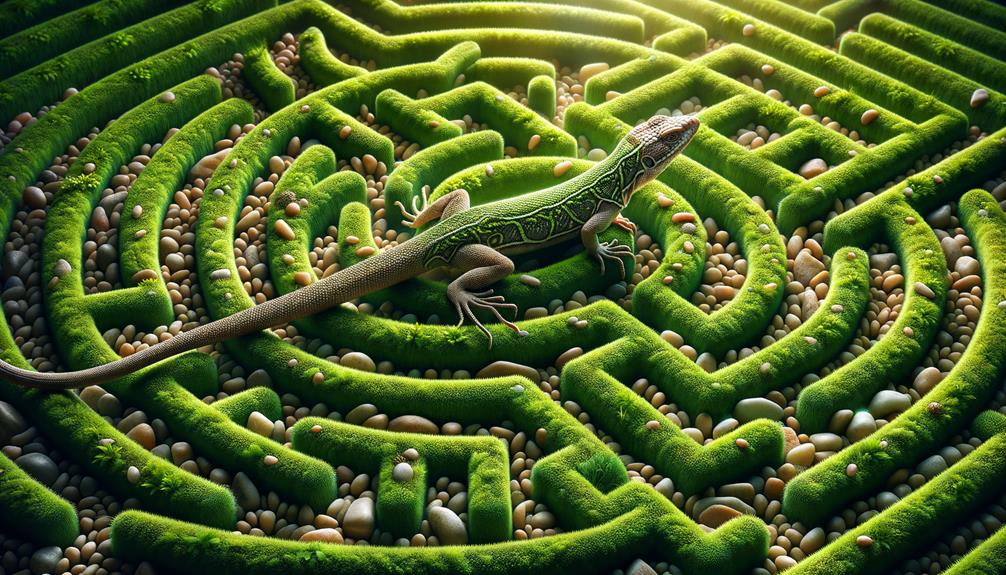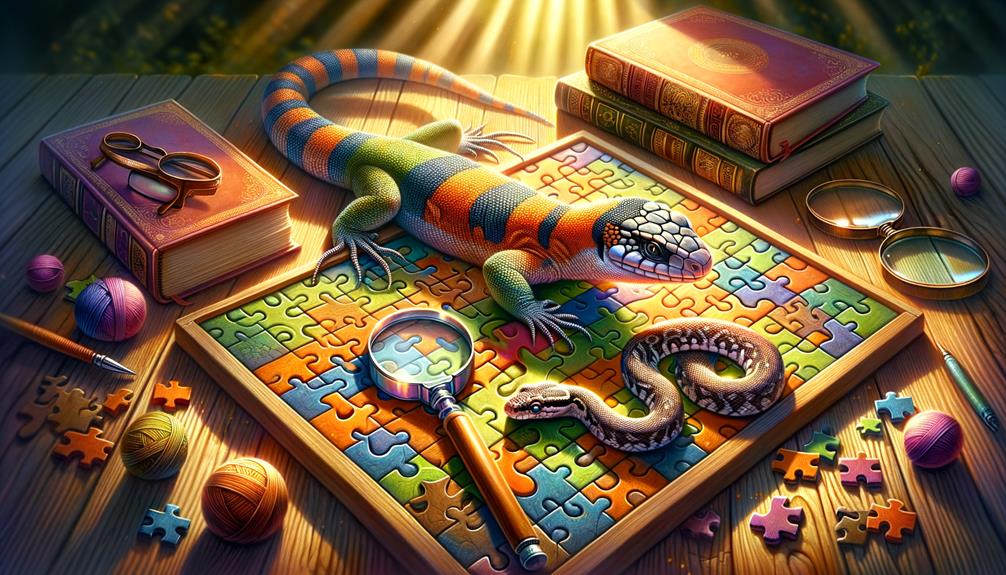Reptiles are more intelligent than people often give them credit for. I used to think they were simple-minded, but that's not true. In reality, reptiles have advanced cognitive abilities. They can remember individuals and adapt their behavior based on experiences. Their limbic system, which is responsible for emotions and memory, is surprisingly advanced. When it comes to social interactions, reptiles engage in complex behaviors like courtship and parental care, and they use chemical signals to communicate with each other. They're even capable of making complex decisions, weighing the pros and cons of a situation, much like many mammals do. It's clear that reptiles' intelligence is more sophisticated than we often assume, and there's still much to learn about their remarkable mental abilities.
Key Takeaways
Reptiles are smarter than you think. They have advanced mental abilities that challenge the outdated notion of the 'lizard brain'. These animals can learn and adapt their behaviors based on experiences, showing off their problem-solving skills. They also have impressive long-term memory capabilities, recognizing individual humans. Some reptiles even form strong bonds with their owners, proving they're capable of affection. What's more, they can make complex decisions by weighing risks and benefits.
Understanding Reptile Cognition
Many people underestimate reptile cognition, but research reveals they possess sophisticated mental abilities. Contrary to popular belief, reptiles aren't just instinct-driven creatures. They demonstrate spatial awareness, social intelligence, and problem-solving skills that rival those of some mammals. Take crocodiles and monitor lizards, for example; they exhibit behaviors that suggest emotions like fear, anxiety, and excitement, challenging the outdated notion of the 'lizard brain' as rudimentary and limited.
The limbic system in reptiles is more advanced than we give it credit for. This part of their brain, involved in emotional responses and memory, indicates higher-order functioning. Reptiles demonstrate long-term memory capabilities, with some species recognizing individual humans even after extended periods, suggesting a level of social intelligence that many don't associate with these creatures.
Reptiles can learn and adapt their behaviors based on experiences, displaying a remarkable capacity for problem-solving. This adaptability and learning ability underline the complex cognitive processes at play. By recognizing these aspects of reptile cognition, we can appreciate these fascinating creatures in a new light.
Behavioral Patterns in Reptiles

Reptile behavior is more fascinating than you might think. These creatures, with their diverse neuron types, exhibit a wide range of behaviors that defy the outdated 'cold-blooded' stereotype. For instance, reptiles engage in complex courtship rituals and parental care, demonstrating their sophisticated communication skills through chemical signals.
Studies have shown that reptiles can experience a range of emotions, from anxiety and fear to excitement. This emotional capacity challenges the myth that they are simply instinct-driven beings. Some reptiles, like iguanas and tegus, have been observed forming strong bonds with their owners, dispelling the notion that they're not capable of affection.
Some intriguing reptile behaviors include:
- Elaborate courtship displays: Reptiles use these to attract mates.
- Caring for their young: Reptiles protect and nurture their offspring.
- Chemical signals: They use scents to convey information.
- Rapid movements: Reptiles can move quickly in response to threats.
Contrary to popular belief, reptiles aren't always slow; they can exhibit bursts of speed when necessary. And, a reptile's growth is determined by genetics, not the size of its enclosure. These insights paint a picture of reptiles as dynamic, emotionally complex creatures, deserving of our respect and understanding.
Social Interactions Among Reptiles

Reptiles are more social than you think. They engage in behaviors like courtship rituals and parental care, which demonstrate a depth of social complexity. These interactions aren't just survival tactics, but rather a showcase of their intricate and adaptable nature.
Research has found that reptiles use chemical signals to communicate, conveying information about territory, reproductive status, and even stress levels. Iguanas and tegus, for instance, form social bonds with their human caretakers, seeking out affection and physical contact. This behavior proves that reptiles are capable of forming connections, debunking the myth that they're solitary and emotionless.
The idea that reptiles operate solely on basic survival instincts has been disproven. Scientific studies have shown that reptiles experience a range of emotions, including anxiety, fear, and excitement. This highlights their sophisticated neurobiology and cognitive capabilities.
From territorial displays to cooperative hunting, reptiles exhibit a wide range of social behaviors, illustrating their adaptability. This evidence challenges our long-held misconceptions and reveals the rich, social lives of these remarkable creatures.
Decision-Making Abilities

Scientists have made a groundbreaking discovery about reptiles, revealing that they are capable of making complex decisions by weighing risks and benefits. This finding challenges the long-held notion that reptiles lack the intelligence of mammals and birds. In reality, certain species of reptiles, such as crocodilians and turtles, possess remarkable cognitive abilities.
Reptiles are able to:
- Learn and remember spatial information
- Adapt their behaviors to changing environments
- Maximize rewards and minimize threats
- Alter their decision-making strategies based on social context and experiences
These findings show that reptiles' decision-making abilities are more sophisticated than previously thought. The dorsal ventricular ridge, a brain structure in reptiles, plays a vital role similar to regions in the human brain responsible for decision-making and cognitive flexibility. This structure helps reptiles process information, evaluate risks and benefits, and make informed decisions.
Understanding reptile cognition not only challenges myths about their intelligence but also provides insight into the evolution of cognition across species. It's fascinating to see how these creatures, often perceived as purely instinctual, exhibit behavioral flexibility and adaptability. This new perspective on the capabilities of reptilian brains challenges us to rethink our assumptions about animal intelligence.
Debunking Popular Reptile Myths

While exploring the sophisticated decision-making abilities of reptiles, it's essential to correct some widespread misconceptions about these fascinating creatures. Let's start with the idea that snakes are slimy. In reality, their scales are soft, dry, and textured, which makes them feel quite different from what many people imagine.
It's a common misconception that turtles and tortoises are always slow. However, they can move quickly when needed, showcasing their agility. Another myth is that a snake's growth is limited by the size of its enclosure. This isn't true; snakes continue to grow throughout their lives, regardless of their living conditions.
Many people think all reptiles are cold, distant creatures, but some, like iguanas and tegus, can be surprisingly affectionate, even seeking out human companionship. This also highlights that tegus are warm-blooded, which challenges the oversimplified notion that all reptiles are cold-blooded.
Understanding the truth about these creatures opens our minds to the wonders of the natural world. By correcting reptile myths, we reveal a reality that's more complex and fascinating.
Frequently Asked Questions
How Intelligent Are Reptiles?
Reptiles are surprisingly intelligent creatures. They display complex social behaviors, form bonds with humans, and even solve problems. Ongoing research is revealing their advanced cognitive abilities, showing that they're more conscious than previously thought.
What Triggers Your Reptilian Brain?
They say old habits are hard to break. When I'm stressed, my reptilian brain takes over, triggering a fight-or-flight response. It's an instinctual reaction that drives basic survival actions, but I try to balance it with rational thinking to navigate challenging situations effectively.
Is the Limbic Brain the Same as the Reptilian Brain?
The limbic brain and the so-called reptilian brain are not the same thing. The limbic system is responsible for emotions and memories, while the idea of a reptilian brain oversimplifies the complexity of our brain's evolution and development.
What Is the Tri Brain Theory?
The triune brain theory, developed by Paul MacLean in the 1960s, proposes that our brain evolved in three stages: reptilian, limbic, and neocortex. Despite its initial popularity, modern neuroscience and evolutionary biology now consider this theory to be inaccurate.



